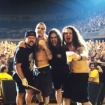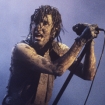"Dude, a big roadrunner just came through my backyard and jumped over at 15-foot fence." That's former Pantera bassist Rex Brown speaking with Revolver from his new place in New Mexico. The occasion is the 20th anniversary of Reinventing the Steel, which was released in March 2000. Co-produced by drummer Vinnie Paul and guitarist Dimebag Darrell, the album proved to be Pantera's last — the band split up in 2003 after a period of unfortunate and well-publicized acrimony between Dimebag and vocalist Philip Anselmo.
Still, Reinventing the Steel proved to be a solid swansong — an energized and hugely self-referential antithesis to 1996's caustic and abrasive The Great Southern Trendkill. Introduced to the world via lead single "Revolution Is My Name" — captured in a comedic video by underground director Jim VanBebber imagining all four members as little kids, complete with facial hair — Reinventing also boasted some of Dime's most dizzying guitar work, not to mention a guest solo from Slayer's Kerry King on "Goddamn Electric."
As we talk with Brown, he frequently pauses to refresh his memory by blasting the record in the background. "I haven't listened to this record in a long time," he explains. "After Dime got killed, I just couldn't listen to it because that was basically our last times together. We toured for a year and a half after that, but still — it was very hard for me to listen to, even years after Dime was killed."
WHAT'S THE FIRST THING THAT COMES TO MIND WHEN YOU THINK OF THE WRITING AND RECORDING OF REINVENTING THE STEEL?
REX BROWN That record was the one where we really sat down and focused to try and come up with a theme for it. The conversation was like, "Everybody make a list of the songs that you think are the quintessential Pantera songs." We didn't know this was going to be our last record together, but we wanted to make one that was cohesive. Before, we would just go in and listen to the riff tapes. I think Dime had a riff tape for this one, but it wasn't really going anywhere so we decided to map it out more.
THIS RECORD IS SO MUCH DIFFERENT THAN ITS PREDECESSOR, THE GREAT SOUTHERN TRENDKILL. WHY DO YOU THINK THAT IS?
For the first time, we didn't have [producer] Terry Date in the studio with us. Vinnie and Darrell were gonna produce this one. It's funny — I still call him Darrell. It just comes out this way because I've known him since he was 13 or 14. So anyway, The Great Southern Trendkill — that motherfucker was all over the place. But the thing with us was that we never wanted to make the same record twice. A lot of bands have done that, and it's repulsive kinda, because artistically you're not on the ball. So we started putting these lists together and we really focused hard.
WHAT WAS THE ATMOSPHERE LIKE WITHIN THE BAND AT THIS TIME?
When we were writing, my kids were just about to be born, so we were trying to get in as much work as we possibly could. But then we'd have to take breaks because it was good for us to get away from it. This was also a time when everyone was doing different projects, so there wasn't the same camaraderie and tightness in the band that we had, say, with Vulgar or Far Beyond. Everybody had moved and had their own houses and was doing their own thing. But you have to remember that we toured more between '96 and 2000 than we did in the first three years, so that was part of it.
DIME'S GUITAR PLAYING IS INSANE ON THIS ALBUM. I MEAN, IT ALWAYS IS — BUT THIS TIME IT SEEMS ESPECIALLY OVER THE TOP. WHY DO YOU THINK THAT IS?
A lot of it had to do with the studio being right in his backyard. I think he was down there doing all-nighters, putting all these different sounds in. The songwriting is nuts — Dime is doing some crazy new bends that he hadn't done before. With this one, we had to pick out exactly what Pantera was, and at that time that's what everyone was screaming for. We almost had to butt it up next to Vulgar.
THE BASS SOUNDS HUGE ON REINVENTING. DID YOU DO ANYTHING DIFFERENTLY?
This is actually the first time you could hear the goddamn bass on a Pantera record. It was up in the mix. Man, I worked so hard and so long to get that bass right in the middle. Vinnie had these big concert toms that he would use in the studio, but I said, "Man, let's use a smaller kit on this one just to see what it sounds like." Then we could make it big when we mix. So he got a little bit smaller toms, which helps bring the bass out.
FROM WHAT I'VE HEARD, IT SEEMS LIKE PHIL HAD CLEANED HIS ACT UP A BIT BY THE TIME YOU WERE DOING THIS RECORD.
Yeah, he had definitely cleaned it up from where he'd been. The back pain was a constant thing with him, but it's not my place to say what pain he was feeling. I know that a lot of people in between those two records had died because of drugs, so I think he might've switched to something else. And we weren't drinking as much. We were still drinking a lot — but not as much. We never got really seriously shitfaced in the studio. You couldn't do it when you're writing.
"REVOLUTION IS MY NAME" WAS THE FIRST SINGLE, AND IT GOT NOMINATED FOR A GRAMMY. WHAT DO YOU REMEMBER ABOUT THAT SONG?
I remember shooting the video down in New Orleans. Philip had this director that he wanted to do it with. So we're shooting this video and Dime's best buddy, David Allan Coe, shows up in his tour bus. Somehow he's in the video. See, Dime was actually doing two records at once — this Pantera record and this record we did with David Allan Coe [Rebel Meets Rebel] that didn't come out till years later. That was Dime's baby. That was his fun time — hanging out with the old man. It's funny because they were about 35 years apart, but they were identical. It was nutty.
WHAT'S THE STORY BEHIND KERRY KING PLAYING THE SOLO ON "GODDAMN ELECTRIC"?
I wasn't there, but Slayer was playing the Starplex in Dallas, so Dime and Vinnie brought this mobile recording rig down to the show. The Starplex was our second home, so we could do whatever we wanted there. So they rolled this rig into one of those backstage rooms, set up a mic and an amp and Kerry recorded the part. And it was a first take. I think they got him to do some extra shit on it, but it was as easy as that. It's all dive-bomb shit, anyway. They just needed the noise. So it's not like he had to come to the studio and learn his part. He just had to do what Kerry does.
THE ALBUM SEEMS REALLY CONFIDENT, AND A LOT OF THE SONGS SEEM TO BE ABOUT PANTERA ...
All these bands were trying to emulate what we were doing, but we were the kings of it. All the nu-metal had come in, so we had to be on our toes. We didn't wanna be the old men. If we were still around today and got back together, we'd still run circles around these fuckin' bands.
HOW DO YOU THINK OF REINVENTING TODAY?
This record is the end, so it's hard to talk about. To me, it's a great last performance. One thing we always said is, "You're only as good as your last show." Or your last note, or the last thing you do. Because you don't know what's going to happen tomorrow. It could all end. And I'll be goddamned if it didn't.








